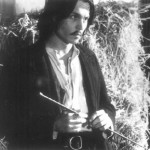A traditional ballad about gypsies and the charm of the “exotic”: a beautiful lady abandons her husband to follow a gypsy, and although pursued and recalled to her responsibilities by her husband, she refuses to go home
From Scotland the ballad spread to England, Ireland and America in a great variety of lyrics and melodies.
Una ballata tradizionale sugli zingari e il fascino dell’”esotico”: una bella lady abbandona il marito per seguire un fascinoso zingaro, e sebbene inseguita e richiamata alle sue responsabilità dal marito, si rifiuta di tornare a casa.
Dalla Scozia la ballata si diffuse in Inghilterra, Irlanda e America in una grande varietà di testi e melodie. Story background
Story background
SCOTTISH VERSIONS
RAGGLE TAGGLE GISPY (standard version)
THE ROVIN PLOUGHBOY (Bothy Ballads version)
JOHNNY FAA – THREE GYPSIES – Child #200 A
GYSPY LADDIE – SEVEN YELLOW GYPSIES – Child #200 B
SEVEN GYPSIES english versions
The Whistling Gypsy irish version
Gypsy Davey (irish version)
AMERICAN VERSIONS:
Black Jack Davey
Gypsy Davvy (Peter Seeger, Woody Guthrie)
Gypsy Davvy (Doc Watson, Sandy Danny)
Roving Gypsy (Celtic Canada)
GYPSY DAVY
In America the name of the gypsy is no longer Johnny Faa as in Scotland but becomes Jack Davy (Davey), nicknamed the Black.
In America il nome dello zingaro non è più Johnny Faa come in Scozia ma diventa Jack Davy (Davey), soprannominato il Moro.
There’s more to life than money and social position, but the strength of one’s own ideas and feelings “… no matter how many times we have been defeated but how many times we have maneged to get up and fight again; and it doesn’t matter how little the life has given us, if we have the richness of music that can sometimes really heal our soul … “(Peter Seeger)
Nella vita non contano solo i soldi e posizione sociale, ma la forza delle proprie idee e dei propri sentimenti: “… non importa quante volte siamo stati battuti e siamo stati sconfitti ma quante volte siamo riusciti a rialzarci e a combattere di nuovo; e non importa quanto poco la vita ci abbia dato se abbiamo la ricchezza della musica che può veramente, a volte, guarirci l’anima…” (Peter Seeger)
Pete Seeger in American Favorite Ballads, Vol. 3
Woody Guthrie
Arlo Guthrie
David Hawkins (voce, ghitarra) & Clark Sommers (contrabbasso) 2014
I It was late last night when the boss came home askin’ for his lady The only answer that he got, “She’s gone with the Gypsy Davey, She’s gone with the Gypsy Dave.” II Go saddle for me a buckskin horse And a hundred dollar saddle. Point out to me their wagon tracks And after them I’ll travel, After them I’ll ride. III Well I had not rode to the midnight moon, When I saw the campfire gleaming. I heard the notes of the big guitar And the voice of the gypsies singing That song of the Gypsy Dave. IV There in the light of the camping fire, I saw her fair face beaming. Her heart in tune with the big guitar And the voice of the gypsies singing That song of the Gypsy Dave. V Have you forsaken your house and home? Have you forsaken your baby? Have you forsaken your husband dear To go with the Gypsy Davy? And sing with the Gypsy Davy? The song of the Gypsy Dave? VI Yes I’ve forsaken my husband dear To go with the Gypsy Davy, And I’ve forsaken my mansion high But not my blue-eyed baby, Not my blue-eyed baby. VII She smiled to leave her husband dear And go with the Gypsy Davy; But the tears come a-trickling down her cheeks To think of the blue-eyed baby, Pretty little blue-eyed baby. VIII Take off, take off your buckskin gloves Made of Spanish leather; Give to me your lily-white hair And we’ll ride home together We’ll ride home again. IX No, I won’t take off my buckskin gloves, They’re made of Spanish leather. I’ll go my way from day to day And sing with the Gypsy Davy That song of the Gypsy Davy, |
Traduzione italiano Cattia Salto I Era sera tardi quando il marito giunse a casa e chiese della sua signora e la sola risposta fu “Se n’è andata con lo zingaro Davey, se n’è andata con lo zingaro Dave” II “Sellatemi il cavallo color camoscio con la sella da cento dollari mostratemi le tracce dei carozzoni e dietro a loro viaggerò li correrò dietro” III Non cavalcai che fino a mezzanotte quando vidi i fuochi dell’accampamento e udii le note del chitarrone e la voce degli zingari cantare quella canzone dello zingaro Dave IV Là nella luce del fuoco dell’accampamento vidi il volto di lei brillare il suo cuore in sintonia con il chitarrone e la voce degli zingari cantare quella canzone dello zingaro Dave V “Hai abbandonato la tua casa e la tua famiglia hai abbandonato il tuo bambino? Hai abbandonato il tuo caro marito per andare con Gypsy Davy? e cantare con Gypsy Davy la canzone di con Gypsy Davy” Vi “Sì, ho abbandonato il mio caro marito per andare con Gypsy Davy e ho abbandonato la mia bella casa ma non il mio bambino dagli occhi azzurri non il mio bambino dagli occhi azzurri” VII Lei sorrise nel lasciate il suo caro marito per andare con Gypsy Davy ma le lacrime le colavano dalle guance al pensiero del suo bambino dagli occhi azzurri, piccolo bimbo dagli occhi azzurri VIII “Togliti, togliti quei guanti color camoscio fatti di pelle spagnola dammi la tua mano bianca come giglio e andremo a casa insieme torneremo a casa insieme” IX “No, non mi tolgo i guanti color camoscio fatti di pelle spagnola prenderò la vita alla giornata per cantare con Gypsy Davy quella canzone di Gypsy Davy” |
LINK
http://www.woodyguthrie.org/Lyrics/Gypsy_Davy.htm
https://mainlynorfolk.info/sandy.denny/songs/gypsydavey.html
